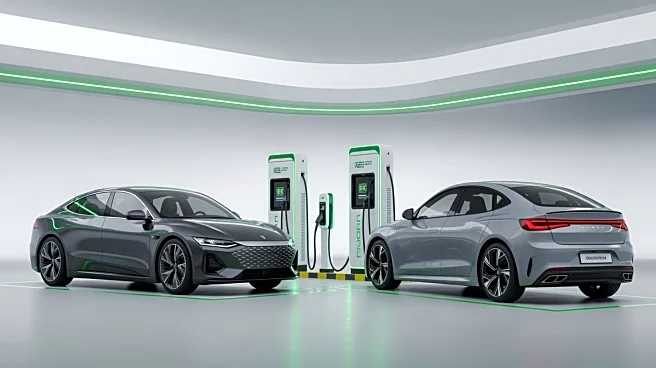What's Happening?
Nissan Europe has partnered with BYD to form a CO2 pool aimed at achieving its 2025 fleet emission targets and avoiding EU penalties. Previously, Nissan was part of a CO2 pool with Renault and Mitsubishi,
which expired at the end of 2024. The decision to partner with BYD was influenced by the availability of credits and overall competitiveness. BYD, known for selling electric cars and plug-in hybrids, offers a low CO2 fleet value, making it an attractive partner. Nissan's current CO2 emissions significantly exceed its 2025 target, necessitating this partnership to avoid penalties. The pooling strategy allows manufacturers to combine their fleet emissions to meet regulatory targets collectively.
Why It's Important?
This partnership is crucial for Nissan as it faces challenges in meeting its CO2 emission targets independently. The collaboration with BYD, a leader in electric vehicle sales, provides Nissan with a strategic advantage in reducing its fleet emissions. This move reflects the broader industry trend of forming alliances to meet stringent environmental regulations. The partnership could influence Nissan's market strategy, potentially increasing its focus on electric vehicle production to align with emission goals. The pooling arrangement highlights the growing importance of electric vehicles in achieving sustainability targets and avoiding financial penalties.
What's Next?
Manufacturers have until the end of the year to form CO2 pools for 2025 sales, suggesting potential announcements of similar agreements in the coming months. Nissan's future strategy may involve expanding its electric vehicle offerings, including the launch of new models like the Leaf and electric Micra in 2026. The success of this partnership could encourage other manufacturers to seek similar alliances, impacting the competitive landscape of the automotive industry. The EU's relaxed regulations for 2025-27 provide some flexibility, allowing manufacturers to offset poorer performance in 2025 with better results in subsequent years.
Beyond the Headlines
The shift towards forming CO2 pools underscores the automotive industry's adaptation to regulatory pressures and the increasing role of electric vehicles in achieving sustainability. This development may prompt discussions on the ethical implications of pooling emissions and the transparency of such arrangements. The partnership could also influence consumer perceptions, potentially boosting demand for electric vehicles as manufacturers strive to meet environmental targets.








